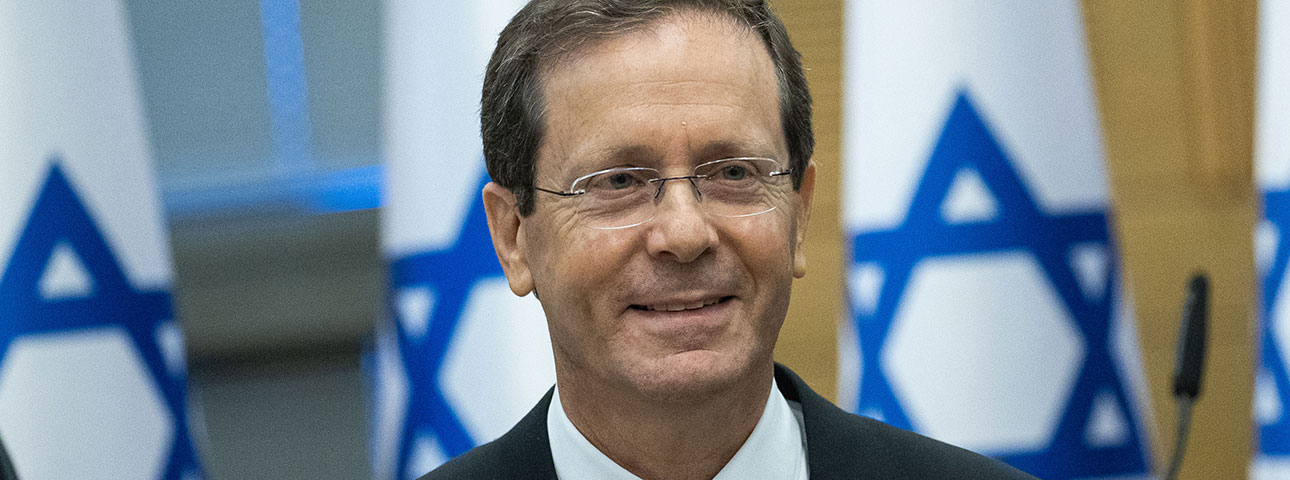The Two Strategic Challenges Facing Israel's New President
Israel needs a president who will position social solidarity and common purpose as supreme values as an alternative to the toxic competition between the competing political blocs that have held the Israeli people hostage.

President Herzog | Flash 90
Just a couple of days ago, the Knesset elected the new president of the State of Israel. As in the past, questions are being raised as to the necessity of the institution of the presidency, and there are even calls for its elimination. These are largely based on the argument that the president is a purely ceremonial figure lacking any real powers or influence.
The truth is that the current elections were held against the backdrop of two major crises, one internal and the other external — both of which are areas where the next president is sure to play a key role. The internal crisis is a combination of the unprecedented political paralysis that has gripped Israel for two and a half years, the eruption of riots and violence in recent weeks, and the growing divisiveness and tensions among the diverse groups making up the mosaic of Israeli society.
The external crisis has attracted less attention in Israeli public discourse and garnered less public awareness. However, we must take note of the fact that in addition to the rise of antisemitism throughout the world, we are also approaching a dangerous low-point in Israel’s relations with North American Jewry as well as the increasing possibility of tension with the US administration and certain elements of the Democratic Party.
The newly elected president can play an important, and some would a vital role in guiding the country through these two arenas. The Basic Law: The President of the State, describes the president as the “Head of State.” In the current social climate, in which almost every public figure and institution in Israel is under threat of delegitimization, the presidency is essential for bolstering the country’s internal and external resilience. The strength of this institution lies in its apolitical and nonpartisan character, and in the public trust it enjoys, and thus — the fact that it has almost no statutory powers does not detract from its potential influence.
On the internal front, concern is growing over our rapidly splintering society lacking any unifying language, shared culture, or common interests to all our country’s sectors. This environment clearly demonstrates the crucial significance of a single national figurehead around whom the Israeli people can unite, and who can give voice to what we all share in common. A successful president can also bring to the fore fundamental democratic values and shared public interests. This is not only about improving Jewish-Arab relations in Israel, but also the relations with the diverse elements of Haredi society and with all other sectors in need of an institution that promotes consensus and emphasizes what we share, far more than what divides us.
We urgently need a president who will position social solidarity and common purpose as supreme values. The constant fighting and hatred between competing political blocs have held the Israeli people hostage, and it has sometimes seemed that the only remaining responsible adult is the president. Time after time, we have heard the outgoing President Rivlin call on the political echelon to do better and to protect the interest of the Israeli public, and prevent repeat elections. The president has also shone a spotlight throughout his term of office on actions and statements that have threatened the most basic and agreed-upon rules of the democratic game. These events have emphasized the necessity for an apolitical higher institution of state that will stand guard and protect Israeli democracy.
Given recent regional and national developments, the incoming president will also have a unique strategic role in blocking dangerous trends and pursuing promising opportunities on the external front. First, the institution of the presidency should serve as the axis for Israel’s relationship with world Jewry; a relationship whose significance was highlighted during the recent conflict with Gaza and at a time of rising antisemitism globally. Moreover, the link to Israel has been become far weaker and more fragile among growing segments of North American Jewry, especially among the more liberal and progressive elements. As the most apolitical and unifying institution in Israeli society, the president has the power to serve as an appropriate address for Diaspora Jews of all streams.
Finally, the most worrying strategic trend is the waning support for Israel among important segments of the American public and political system. Israel can no longer afford to neglect its strategic alliance with its greatest friend. Thus, the president, who also serves as head of state, will have an important role to play in communicating directly and persuasively with the American people and its political leaders. Over the past decade, a perception has gained prevalence that certain elements of Israel’s leadership invested heavily in fostering relations with the Republican Party, at the expense of the efforts traditionally invested in maintaining bi-partisan support for Israel. Now we are paying the price. The incoming president will play a strategic role in rehabilitating bi-partisan support for the alliance between the two countries.
The Knesset has elected a new “head of state” and it is clearer than ever that the president is not only a unifying figure who brings people together, but a necessary institution that safeguards Israel’s vital interests. We must all hope that Isaac Herzog, the new president, will soon begin a successful seven-year term of office that will include concrete achievements for Israel on both the internal and external fronts
The article was published in the Times of Israel.
